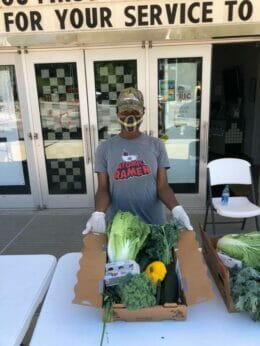Meet the Farmer Helping Black Kentuckians Return to Their Agricultural Roots
The initiatives of one burgeoning social enterprise give Black-owned farms a platform while connecting them to a wider swath of locals and visitors.
Meet the Farmer Helping Black Kentuckians Return to Their Agricultural Roots
The initiatives of one burgeoning social enterprise give Black-owned farms a platform while connecting them to a wider swath of locals and visitors.

Black Soil founders Ashley C. Smith and Trevor Claibornby Tiffany Combs, Magnolia Photo
“Produce with a purpose” is how Ashley Smith describes her vision for Black Soil, the agribusiness she co-founded that links individuals and families with Black growers and producers across Kentucky. Smith says it evokes a sense of nostalgia and pride of place. “These moments actively bring to life our mission of taking them back to their heritage and legacy in agriculture,” says Smith.
In the early twentieth century, 15 percent of America’s farms were Black-owned. Today, of the nearly 76,000 farms in Kentucky, only 1.4 percent–roughly 600–are owned by Black farmers. Black Soil aims to face this disparity head on.
It started in 2017 when Smith, a Lexington native and University of Kentucky graduate, began attending city hall meetings and noticed that Black landowners in rural parts of Fayette County didn’t have a voice. Smith did further investigating and found a lack of active Black farmers in the area, which was surprising to her, as she grew up in rural spaces. She recalls picking tomatoes and cucumbers with her mom, dad and baby sister in her backyard garden and visiting her dad’s family on their sprawling family farm in Alabama, and counts ripe peaches, yellow watermelon and bell peppers topped with Creole seasoning among her favorite produce. She wanted to share those experiences with others.
With her husband Trevor Claiborn, Smith traveled outside of the county to meet and talk with Black farmers such as André Barbour and Teheran Jewell of Barbour Farms. The fourth-generation farmers shared some of the racist incidents they encountered, such as an inaccessibility to certain markets and tales of customers dropping their CSA shares after learning theirs was a Black-owned business. This struck Smith as both odd and disheartening. “The second largest city in the state is actively missing these grand opportunities to have connectivity and abundance, amplify positive stories and have a more shared, understood history.”
Smith and Claiborn, who holds a bachelor’s degree in agriculture, partnered with Barbour Farms to create the pilot program for Black Soil. The initial goal was to foster relationships between Lexington and Louisville natives and rural Black farmers through farm tours and other event-based education that builds respect for and understanding of the agricultural lifestyle–past and present. The eventual launch of farm-to-table dinners created an additional bridge, as harvested fruits and vegetables went into curated menus.
In 2020, Black Soil launched its CSA while also facing the pandemic and what Smith describes as “a convoluted corporate response to a racial reckoning.” She likened the challenges of that period to being in a library during an earthquake and having to decide between trying to hold up the falling shelves or not falling through the cracks on the floor. But she took it all as a sign that she needed to be doing even more. She refocused her sales, marketing and advocacy efforts, drawing on the small staff, several of whom began as interns, to create safe spaces within the larger industry.

Over the years, Black Soil has evolved to include other Black farmers, allowing them to gain a greater market share and make healthier options more widely available to more people. Travis Cleaver of Cleav’s Family Market met Smith about five years ago, when their customer base was concentrated in Hodgenville, Elizabethtown, Fort Knox and Louisville. “Thanks to her marketing efforts, we quickly expanded into Lexington, and now it’s our largest area of customers,” says Cleaver. “Ashley has helped us grow tremendously with her expertise in marketing and her connections around Lexington.”
Today, Cleav’s Family Market is the primary produce vendor for Black Soil’s CSA, which has grown to 500 households. The surplus is sent to the city’s west end, a historically Black community in the middle of a food desert. But Smith is quick to point out that reducing their mission to putting vegetables in a bag misses the mark of purpose-driven agriculture. “You’re taking a farmer’s hard work and making sure a family–whether they have received their share through a donation or are paid in full–is receiving a high-quality representation of a Kentucky black farmer who prides themselves on their craft.”
Admittedly, the mission isn’t easy. Black Soil’s focus on economic unity, collaboration and cooperation is often in direct contrast with the overly competitive nature of multi-generational, highly-leveraged, wide-capacity mainstream agriculture. But while these traditional gatekeepers can often be close-minded, Smith says that the challenge of dealing with them is balanced by the reward of being able to walk away from anything that doesn’t further the goal of empowering Black farmers. “We don’t have to shrink ourselves into anyone else’s program that’s not fitting us,” she says. “We look at the sum of everything we do and what we can let go.”
As Black Soil enters its fifth year, Smith looks ahead to year 10 and beyond. She hopes to become a multi-generational Kentucky Black-owned agro-business, with ample funding and capacity-building opportunities to expand the already diversified lineup of services, products and programs. At the heart of it all is a philosophy of embracing the Black farmer as a centerpiece of sustainability for urban communities–whose enslaved ancestors who worked in hemp fields and distillery sheds on plantations served as the genesis for developing the state’s agriculture.
“This is a history that allows us to explore what makes us unique and see everyone represented at the same time–Black, white, rural, urban–across the spectrum of identity,” says Smith. “And it helps us tell that modern story.”
Follow us
This work is licensed under a Creative Commons Attribution-NoDerivatives 4.0 International License.
Want to republish a Modern Farmer story?
We are happy for Modern Farmer stories to be shared, and encourage you to republish our articles for your audience. When doing so, we ask that you follow these guidelines:
Please credit us and our writers
For the author byline, please use “Author Name, Modern Farmer.” At the top of our stories, if on the web, please include this text and link: “This story was originally published by Modern Farmer.”
Please make sure to include a link back to either our home page or the article URL.
At the bottom of the story, please include the following text:
“Modern Farmer is a nonprofit initiative dedicated to raising awareness and catalyzing action at the intersection of food, agriculture, and society. Read more at <link>Modern Farmer</link>.”
Use our widget
We’d like to be able to track our stories, so we ask that if you republish our content, you do so using our widget (located on the left hand side of the article). The HTML code has a built-in tracker that tells us the data and domain where the story was published, as well as view counts.
Check the image requirements
It’s your responsibility to confirm you're licensed to republish images in our articles. Some images, such as those from commercial providers, don't allow their images to be republished without permission or payment. Copyright terms are generally listed in the image caption and attribution. You are welcome to omit our images or substitute with your own. Charts and interactive graphics follow the same rules.
Don’t change too much. Or, ask us first.
Articles must be republished in their entirety. It’s okay to change references to time (“today” to “yesterday”) or location (“Iowa City, IA” to “here”). But please keep everything else the same.
If you feel strongly that a more material edit needs to be made, get in touch with us at [email protected]. We’re happy to discuss it with the original author, but we must have prior approval for changes before publication.
Special cases
Extracts. You may run the first few lines or paragraphs of the article and then say: “Read the full article at Modern Farmer” with a link back to the original article.
Quotes. You may quote authors provided you include a link back to the article URL.
Translations. These require writer approval. To inquire about translation of a Modern Farmer article, contact us at [email protected]
Signed consent / copyright release forms. These are not required, provided you are following these guidelines.
Print. Articles can be republished in print under these same rules, with the exception that you do not need to include the links.
Tag us
When sharing the story on social media, please tag us using the following: - Twitter (@ModFarm) - Facebook (@ModernFarmerMedia) - Instagram (@modfarm)
Use our content respectfully
Modern Farmer is a nonprofit and as such we share our content for free and in good faith in order to reach new audiences. Respectfully,
No selling ads against our stories. It’s okay to put our stories on pages with ads.
Don’t republish our material wholesale, or automatically; you need to select stories to be republished individually.
You have no rights to sell, license, syndicate, or otherwise represent yourself as the authorized owner of our material to any third parties. This means that you cannot actively publish or submit our work for syndication to third party platforms or apps like Apple News or Google News. We understand that publishers cannot fully control when certain third parties automatically summarize or crawl content from publishers’ own sites.
Keep in touch
We want to hear from you if you love Modern Farmer content, have a collaboration idea, or anything else to share. As a nonprofit outlet, we work in service of our community and are always open to comments, feedback, and ideas. Contact us at [email protected].by Kelly Magyarics, Modern Farmer
January 12, 2023
Modern Farmer Weekly
Solutions Hub
Innovations, ideas and inspiration. Actionable solutions for a resilient food system.
ExploreExplore other topics
Share With Us
We want to hear from Modern Farmer readers who have thoughtful commentary, actionable solutions, or helpful ideas to share.
SubmitNecessary cookies are absolutely essential for the website to function properly. This category only includes cookies that ensures basic functionalities and security features of the website. These cookies do not store any personal information.
Any cookies that may not be particularly necessary for the website to function and are used specifically to collect user personal data via analytics, ads, other embedded contents are termed as non-necessary cookies.
Great start! Just don’t expand further than your capitalization will take you. Take time, build up, get that staying power.
That headline is kinda racist if you think about it. Their “agricultural roots” is slavery so saying “Meet the Farmer Helping Black Kentuckians Return to Their Agricultural Roots” might offend some people (me included)
Just so you are aware the hyperlink that is supposed to be to Andre Barbour’s farm is to a Barbour Farms that is not his.